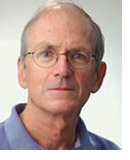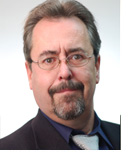
Thomas Cronin
Professor, Biological Sciences
Presidential Research Professor 2009-2012
Thomas Cronin, professor of biological sciences, is internationally recognized for his contributions to the field of visual ecology.
A laboratory and field biologist, Cronin, who joined UMBC in 1983, has mastered the technique of microspectrometry on small invertebrate eyes. His ability to understand the lifestyles of a broad spectrum of animals in their natural settings gives him a unique authority in the field, and he is active in collaborations with investigators from around the world. His work is heavily field-based, primarily on Australia's Great Barrier Reef, and he has also twice undertaken week-long underwater expeditions in the Florida Keys at the world’s only submarine laboratory.
Cronin’s research has been funded by many federal agencies, including the National Science Foundation and the Air Force Office of Scientific Research, and he publishes at least three reviewed scientific papers per year and as many as 11 in a single year. One of his recent papers was the first report of animals being able to see circular polarization, a unique and unusual type of light. His 148 articles have appeared in Science, Nature and Current Biology, as well as other popular U.S. and European science magazines. His research has been featured in articles in many international science journals, including National Geographic Magazine, Science Times, and The New York Times, as well as on the Discovery Channel and in museum exhibits.
Cronin is a Fellow of the American Association for Advancement of Science and a recipient of the USM Regents Award for Excellence and Research and the Graduate Education Award for excellence in teaching and service from the USM-wide program in Marine Estaurine and Ecological Sciences (MEES). He has been invited numerous times to give special talks at prestigious scientific meetings around the world.
An effective, demanding and popular teacher who has taught a variety of courses, Cronin has served on several UMBC committees including chairing the Senate Nominating Committee, the Dean Recruiting Committee, and the University Faculty Review Committee. Always including students in his work, he has graduated six Ph.D. and numerous M.S. students. The Ph.D. students from his group have gone on to faculty positions around the world. His graduate students are highly productive, each publishing up to six papers in reviewed journals as a result of their thesis research.
Cronin earned his Sci.B. in Biology from Dickinson College and his M.A. and Ph.D. in Zoology from Duke University in North Carolina. He also did postdoctoral work in the Department of Biology at Yale University.

Dennis P. Cuddy
Manager, Administration and Facilities,
Department of Chemistry and Biochemistry
2008-2009 University System of Maryland Board of Regents’ Award for Exceptional Contribution to the Institution
Since he was hired nine years ago, Dennis Cuddy Cuddy’s contributions to the teaching and research mission of the Department of Chemistry and Biochemistry have been invaluable. He works tirelessly behind the scenes to ensure that laboratories, classrooms, offices and business process of the Meyerhoff Chemistry Building are operating well.
In addition to his day-to-day tasks, Cuddy has also worked on several major projects in which his leadership, organization skills and technical expertise were a necessity. Cuddy was the department’s manager for the $34-million renovation of the Meyerhoff Chemistry Building. His masterful coordination of the project required working with contractors and faculty to keep classrooms and laboratories running throughout the three-phased renovation. Largely due to his management, the project won a leadership award in 2003.
Cuddy has also contributed to the Chemistry Discovery Center, a project that uses a teamwork approach to learning rather than just lecture. The facility needed to be operational within a short period of time, and Cuddy made it happen by making sure the room was prepared with proper equipment and seating. The program is not only a success in the department but is also being used as a model by the physics and mathematics departments.
Cuddy has also taken on responsibility for coordinating the department’s annual Undergraduate Research Symposium (even though it’s not directly related to his primary responsibilities). The symposium has grown from 60 to 300 students, who come from all over the east coast. Because of Cuddy’s efforts, the event is now funded through the National Institutes of Health. Characteristically, many of Cuddy’s efforts go on behind the scenes, making it possible for the work of students and faculty to shine.
Cuddy earned a double B.S. in Biology and Microbiology at Penn State University (now Molecular and Cellular Biology).





